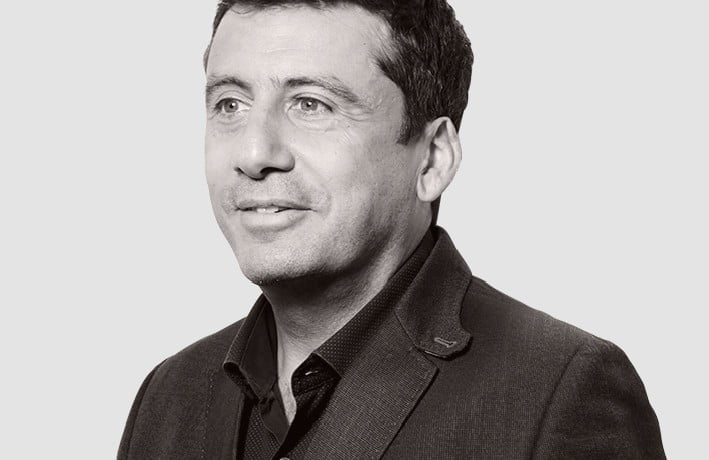We continue our interview series by introducing the partners we are working with on this year’s online Working Internationally Conference.
Organised in collaboration with NMDC, with support from the British Council and curatorial support from Barker Langham, the conference will take the form of online sessions spread over three days, 16 – 18 March 2021. Each conference day explores a key sector theme – Social Justice, Sustainability, and Futures, and is chaired by an ICOM Committee member or partner.
Eric Langham, founder of Barker Langham, talks to Catherine McDermott, ICOM UK Secretary and Interim Vice-Chair.
 Q: Can you tell us about Barker Langham and your role?
Q: Can you tell us about Barker Langham and your role?
A: Barker Langham was born out of a friendship and a meeting of minds. I first met Darren – the Barker of Barker Langham – over 30 years ago when we were both studying archaeology and we were friends for 15 years before establishing Barker Langham. Archaeology ignited our passion for storytelling and, at the same time, gave us a real appreciation of the value of culture and heritage. It is these complementary perspectives that Darren and I championed and built into Barker Langham. For over 15 years now we have been planning and realising incredible cultural projects and today our team includes several more archaeologists – but also writers, curators, business planners, designers, interpreters and researchers.
While we began in the UK, today our work takes us all over the world and alongside our team in London we have people and offices in Berlin, New York, Dubai, Shanghai and Vancouver. This global network both supports and defines us – as we have a constant source of different perspectives and best practice feeding into everything we do. And over the last year, throughout the Covid-19 lockdowns, the ties between our global team have strengthened as virtual working became the norm.
I lead our creative and curatorial team who work on a huge array of diverse projects of different scales. In any given week our team might be drawing up plans for a new mega-museum, meeting with community members to think about how to revive a loved local park, or dialling up a particle physicist to discuss teleportation.
Q: Why is the ‘Working Internationally’ conference partnership with ICOM UK important to Barker Langham?
A: Partnerships have always been the basis of who we are and how we work. They allow us to share and learn and to synthesise – to fuse ideas and better shape our experiences. And in the months and years to come, in the wake of the recent pandemic and economic crises, there will only be more value in the building of relationships. We are all better off working through this together.
Partnering with ICOM UK is a fantastic opportunity. Our organisations share a common goal to open up discussion on museums, their future and their evolution. We want to throw a spotlight on the projects and people behind the scenes that are making change in the world, and this partnership allows us to do that collectively. We look forward to where this relationship will take us in both the short and long term.
Q: Can you tell us about your approach to the talks that Barker Langham curated?
A: It’s a real privilege for us to contribute to this conference and to offer our perspective on the museum world as it continues to shift and evolve. What is especially fascinating is that although we acknowledge that no single country, region, or even museum faces an identical set of challenges, or behaves in the same way, the three topics that we focus on – social justice, futures and sustainability – are topics that define humanity.
To address this we are using the medium of film to allow us to present the complexity of the debates around each topic. Working online over the last year has encouraged us to experiment a bit, and creating films seems like a fun and exciting platform for the conference and any future legacy.
It is our aspiration to make the films conversational so they work in dialogue with the conference participants but also allow us to draw on the wealth of ideas already out there in the world – creating a bigger conversation.
Q: Can you tell us more about each film and talk?
A: With each session, we want to help tease out and nurture a sense of optimism in our sector, as it goes through major upheavals. Through the films we aim to curate a toolbox of ideas and experiences that conference delegates can use to inform and shape their own thinking.
‘Responsive Futures’ looks at how museums are navigating the pandemic and the economic downturn, as well as at how they are grappling with and adapting to – or resisting – broader socio-economic, political and cultural change. Personally, I am really interested to hear about the ways that many institutions have embraced rapid-response collecting as a tool to help us digest our lives as we live them. Each institution is doing this differently and we are keen to explore how they represent the world we are trying to build… and rebuild?
We are very pleased to be working with Fonteini Aravani, Curator at the Museum of London, who will be giving us insight into her project ‘Guardians of Sleep’, and how she is documenting the impact of the pandemic on London as it sleeps. We are also collaborating with Suzy Hakimian, Chair of ICOM Lebanon who will be telling us how museums within Lebanon are continuing to collect despite economic collapse and the physical damage caused by the 2020 explosion.
Looking at social justice, we have created the film ‘Just Outcomes’. It is a piece that considers museums as social actors within their local and global communities, and which tries to get to the root of the idea of social justice. As a sector, it seems that we’re talking about justice a great deal more now than at any other time in recent history. But do we share an idea of what a ‘just world’ looks like materially, or in cultural terms? And do we agree on how to bring about that world? In making this film we met with museum professionals who engage with social justice in very different ways. Matt and Jess Turtle from the Museum of Homelessness are growing an organisation, which raises important questions about how museums relate to the communities they arise out of, and how they prioritise those communities’ needs in times of difficulty and crisis. We’ve also had a great conversation with Deborah Tulani Salahu-Din from the National Museum of African American History and Culture, who shared some really thought-provoking insights into her work to document the Black Lives Matter movement in Baltimore.
Responding to the theme of sustainability, our third and final short film ‘Testaments from the Age of Humans’ asks what role museums can play in protecting the planet. This is a topic that Barker Langham has been considering for a while. We have been looking for ways and platforms through which every museum can become a museum about climate change – about environmental degradation, about Earth’s biodiversity and the damage we’re doing to it. It is the story of our planet. We are collecting stories from around the world that teach us about the Earth and its living systems, but which also reflect the ways museums are responding to different environmental crises. Our proposition is to create a global union of the planet’s storytellers gathering evidence and sharing stories of impact, challenge and hope. It is in its embryonic stages, but it is a project we want to build upon. I am looking forward to seeing where it takes us in the future, and to the partnerships it can help us all foster.
Q: In your opinion, what role should ICOM UK look to play in the future?
A: This conference is ultimately about working together to shape a better world and a better future. For me it is vital that we involve young people – our next generation – to understand how they want to make their world, and to support them and empower them to do so. I am excited to see how our partnership with ICOM UK can help to drive that agenda. Embedding young voices and experiences within future programmes and conferences like this one is critical, and it can be achieved in many ways – for example, building a youth committee of change makers, which will bring perspectives and insight that all ICOM UK members can learn from.
ICOM UK, ICOM and NMDC members can book free conference tickets via Eventbrite. Tickets are also on sale for non-members.

